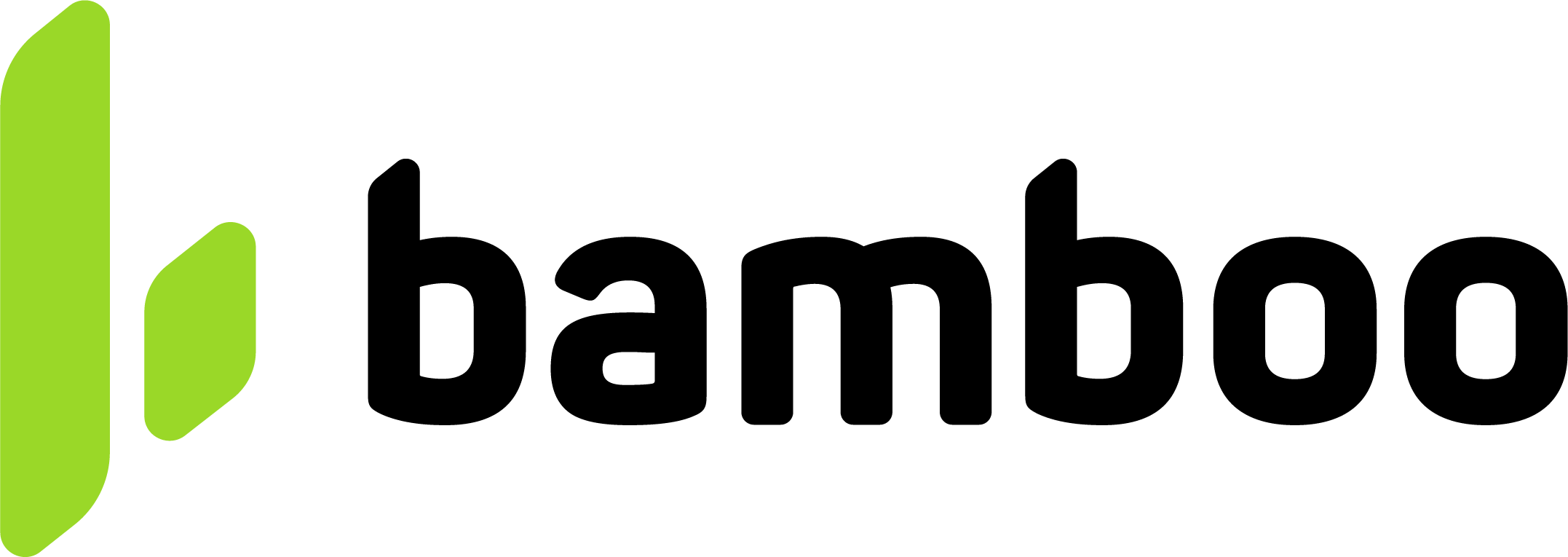Hosted Tokenization Form
The Tokenization Form securely captures the customer's credit or debit card information and converts sensitive data into a token. The token can then be used to process transactions without storing card information directly on the merchant's systems.
The Tokenization Form securely captures customer card details and generates a token for safe payment processing. By using this form, non-PCI compliant merchants can accept payments without directly handling sensitive credit card data, reducing risk and simplifying compliance requirements.
If you're searching for documentation on older version of the Tokenization Form, please contact your Technical Account Manager.
Tokenization Workflow
The following diagram illustrates the complete tokenization flow using the hosted form:
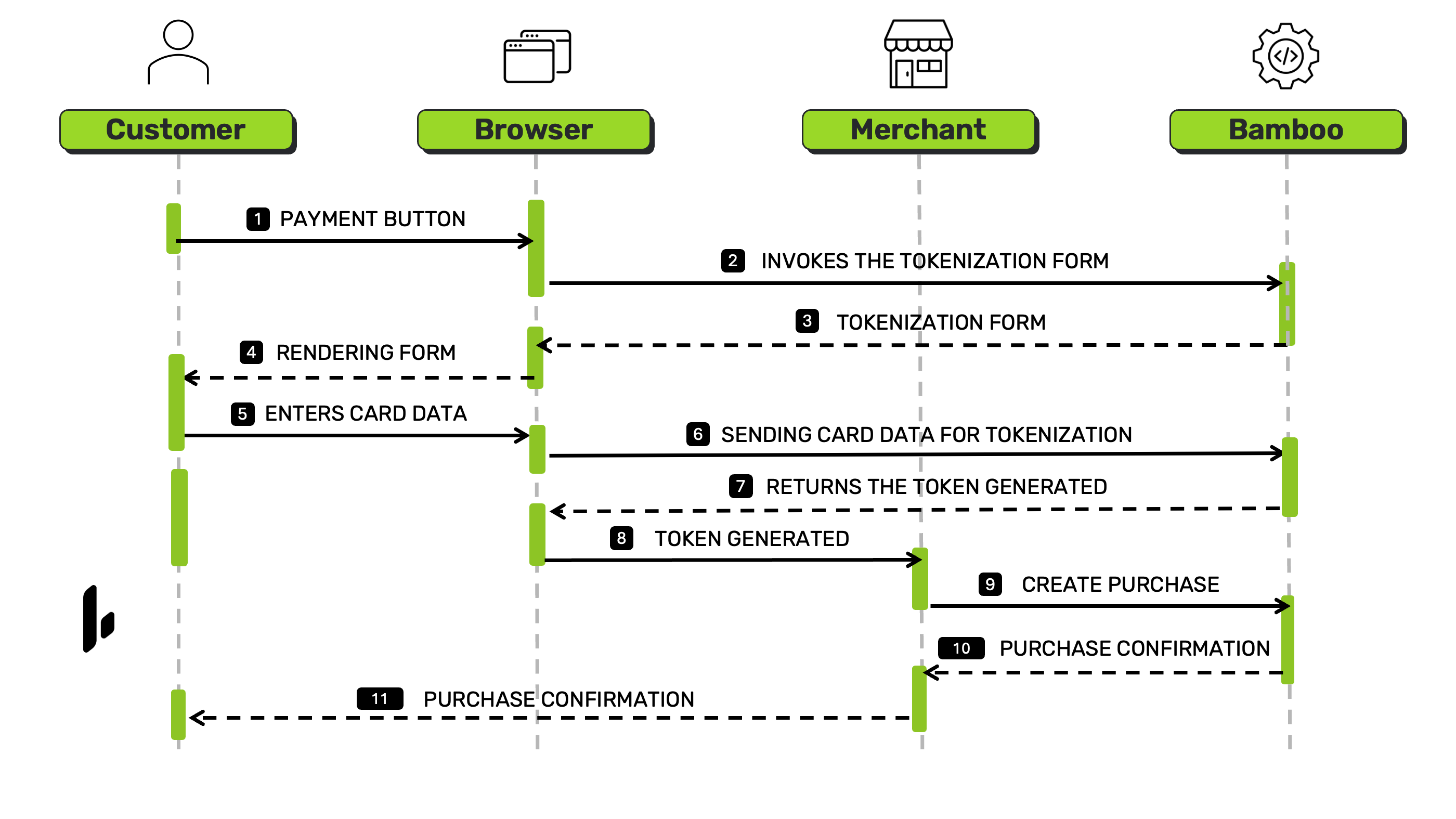
- Customer clicks the payment button.
- Merchant's website invokes the tokenization form from Bamboo.
- Bamboo returns the hosted form to the browser.
- The form is rendered on the page.
- Customer enters card data.
- Card data is securely sent to Bamboo.
- Bamboo generates the token.
- Token is returned to the merchant’s browser.
- The merchant creates the purchase using the token.
- Bamboo processes the payment and sends confirmation.
- Customer receives confirmation.
Integrating the Hosted Tokenization Form
To integrate the Tokenization Form into your checkout flow, simply embed it in your web or mobile application. Once implemented, the form will handle all sensitive card data securely and return a token that you can use for payments through the Bamboo API.
Importing the JavaScript Library
To integrate the Tokenization Form into your website, it's necessary to include a script that points to the form's URL. This allows access to the BambooForm object containing the methods needed to render Bamboo forms.
Staging_
//STAGE - Test Environment:
<script src="https://capture.stage.bamboopayment.com/"
integrity="sha256-X8C6kzz5r0uxNzqtXB8q2tAkorRayzErzeIUm1f0xm4= sha384-Vt+ySpe3/DHlyv34xym7TY55eJ49WxXv6d2cHasu/GG/7h22MGUESq+3kQeHOaLC sha512-B132Bu3DX6JkgamkFER/g2rcsfdTzrwNWOY5O2Wsfe8lm/H7TD1uGdnEuPvudq4ZRdCQDrWk6PwCVkgP1o2Szg=="
crossorigin="anonymous">
</script>Production
//PRODUCTION:
<script src="https://capture.bamboopayment.com"
integrity="sha256-E4GdhdwL0BVk9Xq/21s9qxvjh+anbzbgDVtfH6iCu7E= sha384-vbOT5y4OCop26UzV2VOfg0IAK+ToPU+mR09IcQChnn5kfD5W7b3YQNWXkJob3WWs sha512-j9jTPXduda6zgSUmoTvy9xEOlJOnYS2fKO0dEMiSK5VSB4bGfmKWfSHFLe7pjsFj3lu0K426c9F+7lXf/810Kg=="
crossorigin="anonymous">
</script>Render the Hosted Form
Once the Script pointing to Bamboo forms is imported, you'll have access to the renderTokenizationForm method that renders the Tokenization Form in your application, allowing your users to securely enter their cards.
BambooForm.renderTokenizationForm(configuration);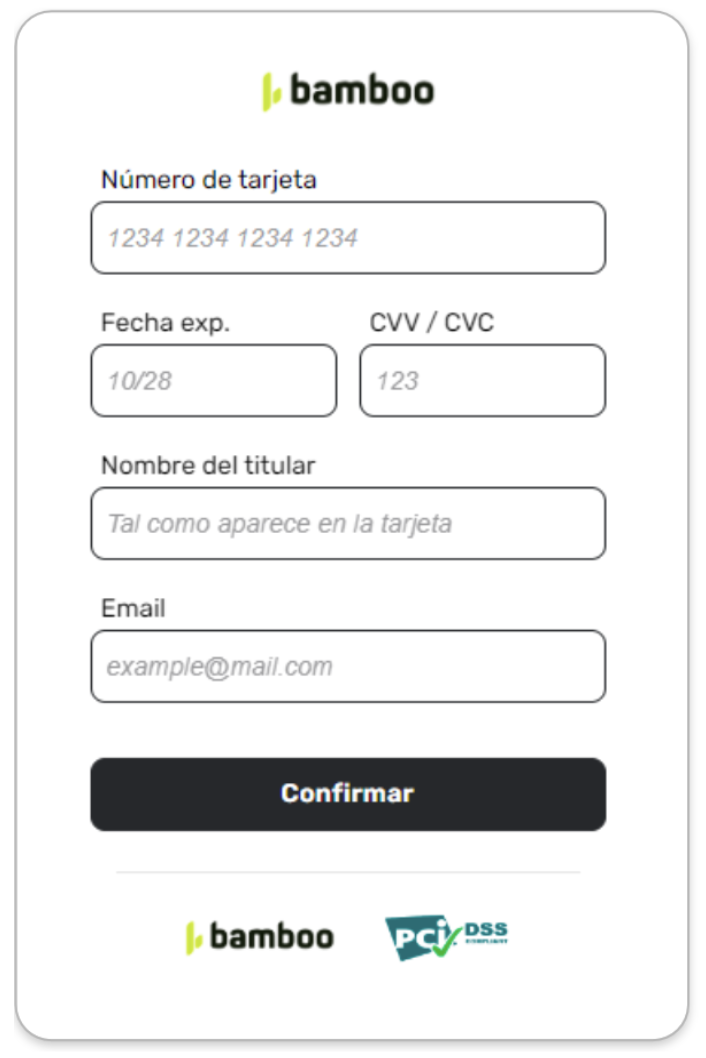
Request Example
<script>
BambooForm.renderTokenizationForm({
containerId: 'MERCHANT_PAGE_CONTAINER_ID',
metadata: {
publicKey: 'MERCHANT_PUBLIC_KEY',
targetCountryISO: 'UY',
customer: {
email: '[email protected]',
cardHolderName: 'Juan Pérez'
},
locale: 'es',
logoUrl: '<https://mieshop.com/logo.png>'
},
hooks: {
onOperationSuccess: (token) => {
console.log('Token received:', token);
},
onOperationError: (error) => {
console.error('Error:', error);
}
}
});
</script>Customize the Form
| Parameter | Type | Mandatory? | Description |
|---|---|---|---|
containerId | string | Yes | HTML container ID where the form will be displayed. |
metadata | object | Yes | Configures information related to the customer and transaction. |
hooks | object | Yes | Callback functions to handle form events. |
Customize your Tokenization Form | metadata object
You can customize the tokenization form with your logo and preferred language, besides pre-fill data already provided by your customer, or restrict the tokenization to specific cards.
| Parameter | Type | Mandatory? | Description |
|---|---|---|---|
metadata → publicKey | string | Yes | Merchant's public key, necessary for secure tokenization. |
metadata → targetCountryISO | string | Yes | ISO code of the country where the transaction will be processed. |
metadata → customer | object | No | Customer information. |
metadata → locale | string | No | Form language, using ISO code Spanish: 'es' (default) English: 'en' |
metadata → logoUrl | string | No | URL of the logo that will appear on the form. If not defined, it's shown without a logo in the header |
metadata → filters | object | No | Allows restricting the card entered by the user to a specific issuing bank or card type |
Customer Information
| Parameter | Type | Mandatory? | Description |
|---|---|---|---|
metadata → customer → uniqueId | string | No | Unique customer identifier. Indicates if a single-use or recurring Token is generated Token Types |
metadata → customer → email | string | No | Customer's email. It's pre-loaded in the form and allows editing if there are syntax errors that prevent token generation |
metadata → customer → cardHolderName | string | No | Cardholder's name. It's pre-loaded in the form without editing option. |
Tokenization restricted to specific Cards
| Parameter | Type | Mandatory? | Description |
|---|---|---|---|
metadata → filters → paymentMediaType | number | No | Identifier of the payment method type (credit card, debit card, etc.). (See payment methods) |
metadata → filters → issuerBank | number | No | Issuing bank identifier. (See banks) |
Handle customer interactions | hooks object
| Parameter | Type | Mandatory? | Description |
|---|---|---|---|
hooks → onOperationSuccess | function | Yes | Callback executed upon successful tokenization. Receives the token as a parameter. |
hooks → onOperationFinalize | function | No | Optional callback executed when the operation is finalized. |
hooks → onOperationError | function | No | Optional callback that handles errors during tokenization. |
hooks → onApplicationLoaded | function | No | Callback executed when the form has been loaded correctly. |
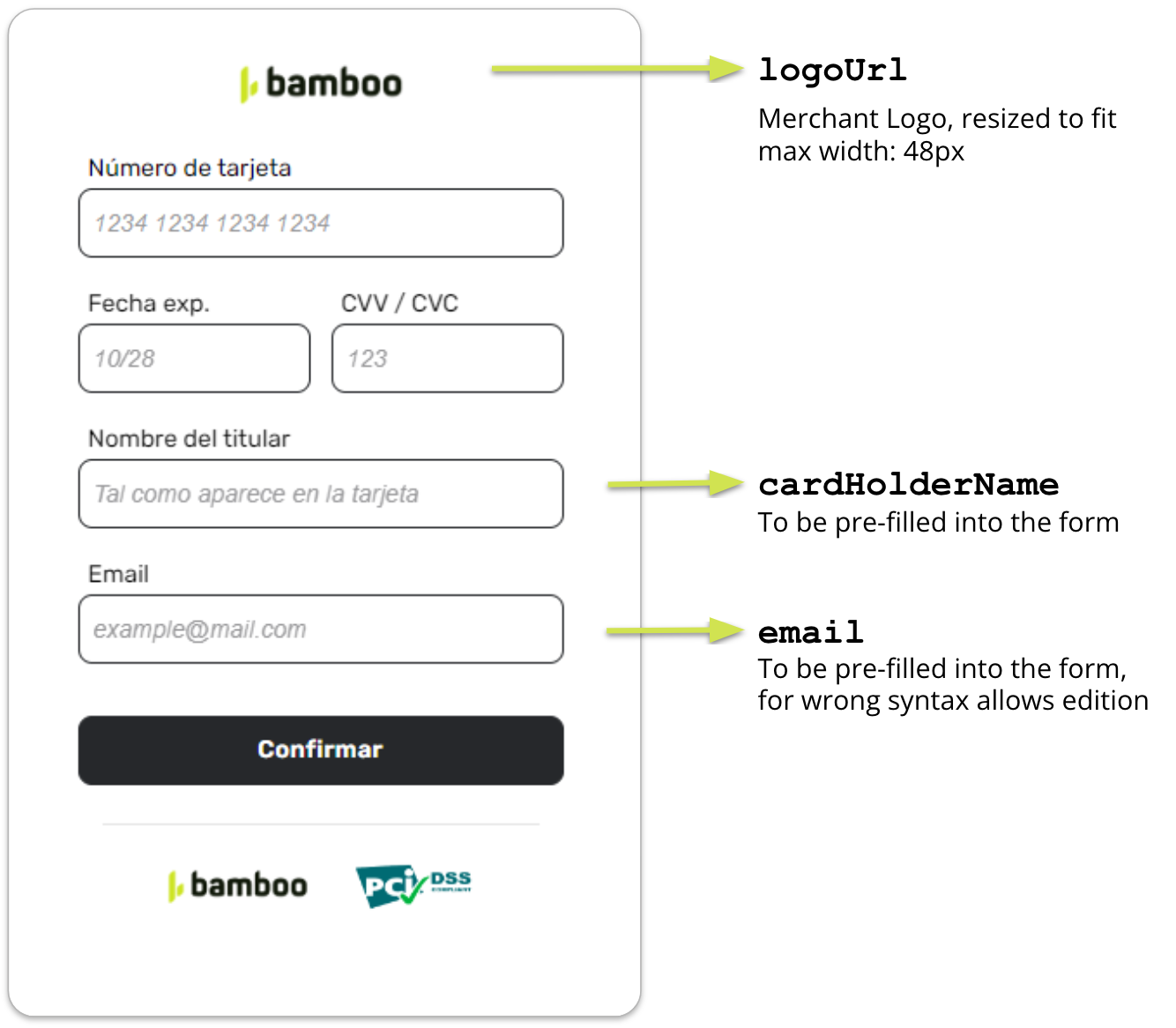
Successful tokenization | Token object
The token object is returned in the onOperationSuccess hook executed upon successful tokenization and contains the following parameters.
| Property | Type | Description |
|---|---|---|
TokenId | string | Token identifier. |
Created | timestamp | Token creation date and time. |
Type | string | Token type, possible values: OneTime, Commerce |
Brand | string | Card brand or payment method used. |
IssuerBank | string | Card Issuing Bank. |
Owner | string | Cardholder's name. |
Bin | numeric[6] | Card identifier. |
Last4 | numeric[4] | Last four digits of the card. |
CardType | string | Payment method or card type, possible values: CreditCard, DebitCard, PhysicalNetwork, PrePaid |
CardExpMonth | numeric[2] | Card expiration month. |
CardExpYear | numeric[2] | Card expiration year. |
Installments | numeric | Amount of installments |
AffinityGroup | object | Affinity program of the card |
IdCommerceToken | numeric | ID of the token created. For OT, the id is 0 as it is stored for 10 minutes. |
Error | Object | Description of an error ocured during the tokenization process. |
Response Example
{
"TokenId": "OT__Vzt3fxGvyyTgbUbsPrMN__em6gAAHYAAA",
"CardType": "CreditCard",
"Installments": null,
"AffinityGroup": null,
"IdCommerceToken": 0,
"Created": "2025-10-21T14:35:54.971",
"Type": "OneTime",
"Brand": "VISA",
"Owner": "John Doe",
"Last4": "0001",
"Bin": "424242",
"CardExpMonth": 12,
"CardExpYear": 29,
"IssuerBank": "Itaú",
"Error": null
}CVV Form
The CVV Form is specifically designed to capture the Card Verification Value (CVV) found on the back of the physical card. This form is used when it's necessary to validate a transaction with the CVV, generally in recurring payments or purchases where the card information has already been previously tokenized.
Typical use: When a customer has previously stored their credit card through the tokenization process but is asked to enter their CVV to validate or complete a transaction, providing an additional layer of security.
Method renderCVVForm
Once you've imported the script that points to the Bamboo forms, you'll have access to the renderCVVForm method, which renders a form dedicated exclusively to capturing the customer's CVV.
BambooForm.renderCVVForm(url, configurationCVV);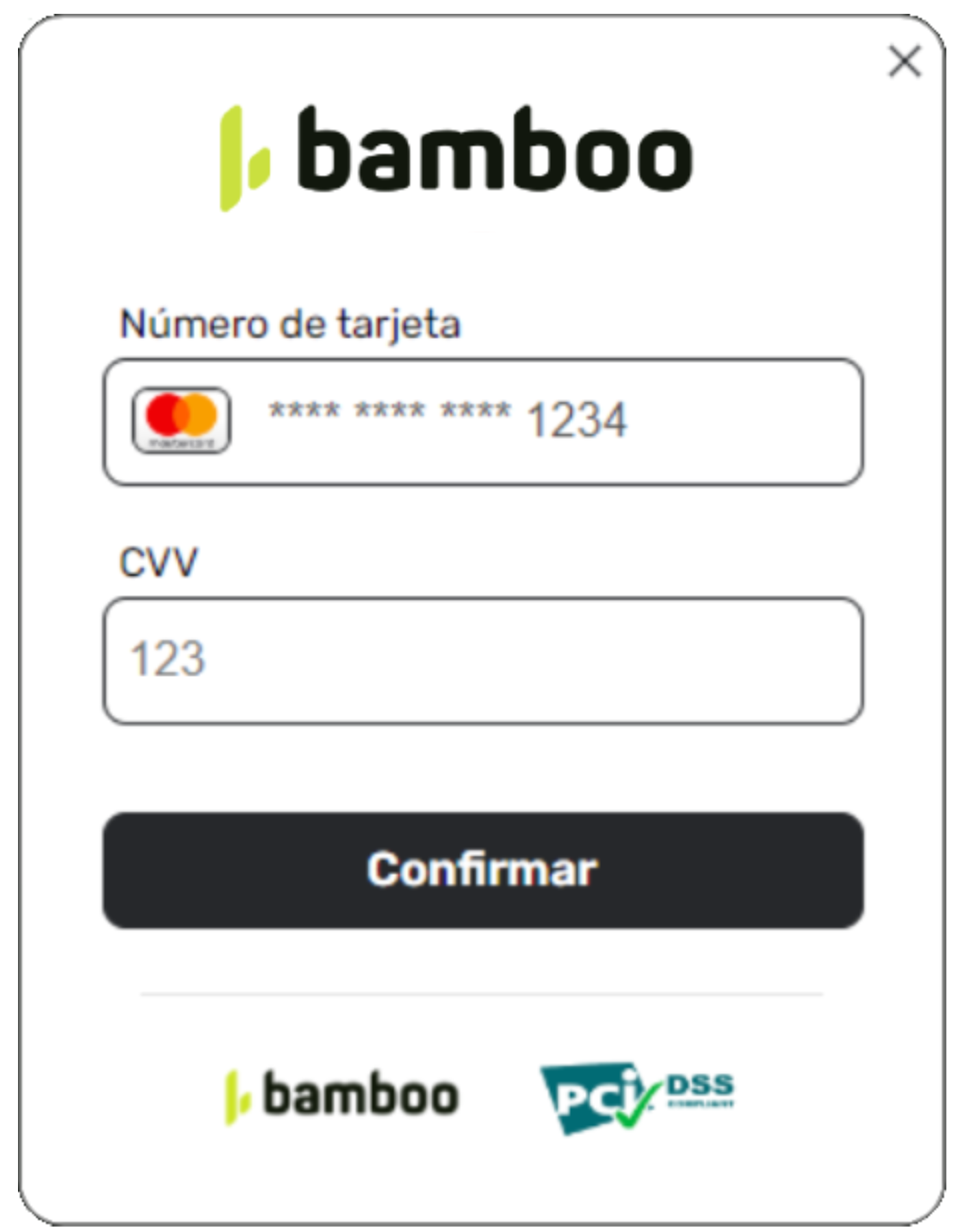
Configuration Parameters
| Parameter | Type | Mandatory? | Description |
|---|---|---|---|
url | string | Yes | The URL containing the session data and the customer's payment profile information. Includes key, session_id, paymentProfileId, brand, and the last four digits of the card. This URL is received as a response when attempting to execute a purchase if CVV verification is required. |
containerId | string | Yes | ID of the HTML container where the form will be displayed. |
metadata | object | Yes | Configures information related to the session and the transaction. |
logoUrl | string | No | URL of the logo that will appear on the form. |
locale | string | No | Language of the form, using an ISO locale code. |
hooks | object | Yes | Callback functions to handle form events. |
hooks → onOperationSuccess | function | Yes | Callback executed upon successful CVV validation. Receives the token as a parameter. |
hooks → onOperationFinalize | function | No | Optional callback executed when the operation is finalized. |
hooks → onOperationError | function | No | Optional callback that handles errors during CVV validation. |
hooks → onApplicationLoaded | function | No | Callback executed when the form has been loaded correctly. |
Usage Example
<script>
BambooForm.renderCVVForm(
'<https://api.stage.bamboopayment.com/v1/Capture/?key=FEdJ84hzdIKBY0gyC7-NDG_I56ONV7HQ&session_id=CA_51864eaf-1603-4fe8-8720-ae8c569ea702&paymentProfileId=375108&brand=MasterCard&lastFour=4008>',
{
metadata: {
locale: 'es',
logoUrl: '<http://www.example.com/>'
},
hooks: {
onOperationSuccess: () => {
console.log('Operation successful');
},
onOperationError: (error) => {
console.error('Error in CVV validation:', error);
}
}
}
);
</script>Next Steps
After you obtain the token, you can pass it into Bamboo’s Purchase API instead of handling card details directly. This allows you to authorize, capture, or cancel transactions.
Learn how to use the token in a purchase request. Includes request and response examples.
Explore endpoint details, parameters, and integration tips.
Payment method id
| Payment Method ID | Name | Type |
|---|---|---|
| 1 | VISA | Credit Card |
| 2 | Mastercard | Credit Card |
| 3 | American Express | Credit Card |
| 4 | OCA | Credit Card |
| 6 | Visa Debit | Debit Card |
| 7 | Visa Prepaid | Prepaid Credit Card |
| 9 | Créditos Directos | Credit Card |
| 11 | PassCard | Credit Card |
| 12 | Diners Club | Credit Card |
| 13 | MasterCard Debit | Debit Card |
| 14 | MasterCard Prepaid | Credit Card |
| 15 | Líder | Credit Card |
| 16 | Club del Este | Credit Card |
| 17 | Cabal | Credit Card |
| 20` | Anda | Credit Card |
| 92 | Anda Debit | Debit Card |
| 94 | Cabal Debit | Debit Card |
| 95 | Club del Este Debit | Debit Card |
Updated 20 days ago
